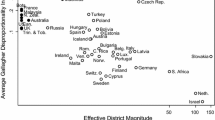Abstract
Antonio Quesada (Public Choice 130:395–400, 2007) argues that a dictator has no more than two to three times the ‘average power’ of a non-dictatorial voter. If Quesada is correct, then his argument has major consequences for social choice theory; for instance, it warrants reconsidering the significance of Arrow’s Theorem. If Quesada is incorrect, however, then his position is dangerously misleading. This paper argues that Quesada is wrong. His argument depends on his own formal account of power, an account that is implausible because it disregards a basic insight common to the standard characterisations of voting power: the idea that one has power over an outcome to the extent that one is able to change that outcome. Claims about power have a counterfactual component; to assert that an individual actually has determined an outcome is also to make an assertion about what would have been the case had that individual acted differently. We can employ David Lewis’s influential account of counterfactuals to show, contra Quesada, that in a dictatorship, non-dictatorial individuals and groups cannot possibly determine a social preference. In short, Quesada is fundamentally mistaken about power, and thus also about the distribution of power in a dictatorship.
Similar content being viewed by others
Notes
Quesada is not the only writer who has recently tried to depict dictatorship in a more benign light. Andranik Tangian also does so, most recently in Tangian (2010). (Quesada cites an earlier conference paper by Tangian as an inspiration.) But because Tangian’s approach is significantly different from Quesada’s, I shall not respond to it here.
This appears to be the case given the definition of a quantity that Quesada subsequently introduces, \(w ^{i} _{xy}\), which is defined in terms of \(w ^{i} _{xy}(P)\) and which—as I shall shortly explain—explicitly requires attention to profiles whose corresponding social ordering includes a preference for x over y.
Quesada (2007: 396) explicitly restricts his attention to strict preferences; he does not consider what impact indifference between preferences might have on his considerations. I shall not dwell on this point, since the criticism I shall have to offer is independent of whether indifference is permitted.
Quesada (2007: 397–398) makes this point in terms of justification functions. I have expressed the point more directly, in the belief that nothing essential is lost by doing so.
Morriss (2002) is one well-known investigation of the notion of power.
Admittedly, Quesada is interested in social welfare functions generally, while the literature on I-power standardly deals only with a restrictive class of social welfare functions: those functions which include only two alternatives. (The usual approach is to imagine a group of individuals, each voting yes or no on some question, and to consider a function that aggregates the votes and decides between these two options.) However, the fact that the standard literature on power deals with a more restrictive class of social welfare functions than those with which Quesada is concerned does not let him off the hook: he ought to reckon with the insight that power (specifically, I-power) involves the capacity to make a difference in the outcome.
I have assumed here that all profiles are possible; in other words, that voters can express any (non-cyclical) orderings that they wish. I presume that Quesada would have no objection, since he has a special interest in the interpretation of Arrow’s Theorem, which involves the acceptance of universal domain as a constraint; Quesada’s article begins by reflecting on Arrow’s Theorem.
References
Felsenthal, D., & Machover, M. (1998). The measurement of voting power. Cheltenham: Elgar.
Lewis, D. (1973). Counterfactuals. Oxford: Blackwell.
Morriss, P. (2002). Power: a philosophical analysis (2nd edn.). Manchester: Manchester University Press.
Quesada, A. (2007). 1 dictator = 2 voters. Public Choice, 130, 395–400.
Tangian, A. (2010). Computational application of the mathematical theory of democracy to Arrow’s impossibility theorem (how dictatorial are Arrow’s dictators?). Social Choice and Welfare, 35, 129–161.
Acknowledgements
I am grateful to two anonymous referees and to the Editor in Chief, William F. Shughart II, for their prompt and helpful comments.
Author information
Authors and Affiliations
Corresponding author
Additional information
This comment refers to the article available at doi:10.1007/s11127-006-9094-0.
Rights and permissions
About this article
Cite this article
Fried, G. Taking dictatorship seriously: a reply to Quesada. Public Choice 158, 243–251 (2014). https://doi.org/10.1007/s11127-013-0092-8
Received:
Accepted:
Published:
Issue Date:
DOI: https://doi.org/10.1007/s11127-013-0092-8



